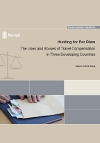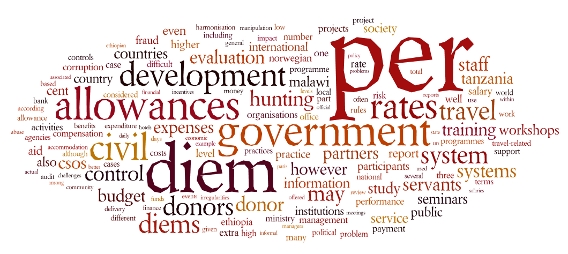 Last month, we discussed a Policy Forum brief about per diems for civil servants in Tanzania. The Norwegian Agency for Development Cooperation has recently published a similar study on Tanzania, Malawi and Ethiopia.1
Last month, we discussed a Policy Forum brief about per diems for civil servants in Tanzania. The Norwegian Agency for Development Cooperation has recently published a similar study on Tanzania, Malawi and Ethiopia.1
This report focussed on such allowances paid for training workshops, seminars, etc. and the effects of this compensation “on development programmes, national budgets and civil service delivery” (p. 15) in the three said countries.
Much of what has been recommended in the report is not new, and the significance of public communication systems has yet to be explored fully. In addition, further action is prescribed mainly to governments as opposed to people. Better understanding the context of the Open Government initiative may make addressing per diem and other payment-monitoring challenges easier.
Benefits of reading this report
Three general points can be made about the usefulness of this report. First, the study is standardized. That is, in each country, NORAD sought to analyse: [a] the government system of per diems and allowances; [b] how this system is controlled; [c] where in the system risks of malpractice originated; and [d] the role of civil society in addressing the risks.
As such, it concludes with corresponding general recommendations (p. 120):
- Use per diems for reimbursement of travel-related expenses only;
- Promote better control systems;
- Secure value for money in training and awareness activities; and
- Address challenges facing the donor community.
Second, the report is a comparative study. So, while it provides an overall context and methodology (p. 40), studies were conducted in Tanzania, Malawi and Ethiopia respectively, and then general observations were made where possible (p. 116).
Third, a comprehensive range of contemporary published sources was used to theorize the basis of this report (p. 144). Most of the supporting literature was published within the last five years, indicating that research on public resources is not scarce (today at least).
Challenges of the report
Two challenges are posed by this report: One concerns the methodology used, and the other concerns the lack of data available within the public sector.

It is commonly understood in the social sciences that qualitative data can be numerically interpreted (with content analysis for example), and quantitative data is collected using qualitative decisions. But in the case of NORAD’s report, much of it is descriptive text, with few easily-quantifiable indicators.
“During fieldwork we relied on in-depth, qualitative interviews with key informants representing a wide range of institutions and stakeholders, including academia, civil society and the media” (p. 16)
While interviews present valuable data, systems only follow rules, and rules in technology come from numbers. So the challenge for moving forward is relating and using both, what people have said with what can be built.
In addition, the report also brings to light the challenges of collecting the very data itself. It was mentioned several times that access to true information was either difficult to negotiate or simply not available.
“Watchdog institutions face practical challenges, particularly in getting access to meaningful information.” (p. 54)
Considering the general definitions of accountability, it is illogical to consider anything related to accounting without first needing complete and true information to account for.
Thinking beyond allowances to public accountability
A few tasks are prompted by this report. This is a summarized list of what Vijana FM has seen others talking about as well as what we have discussed here on our blog:
For starters, let’s try to get past the microeconomic problem of “origins and consequences of allowances and per diems in connection with seminars and workshops” (p. 134), and instead resolve the macroeconomic problem of monitoring public money payments. As Twaweza suggests, we need to remember that “the ones who have the power to reform… are the very ones who benefit”. If a public monitoring system were set in place for all payments, per diems would not be the only line of account (general salaries, tenders, leases and other contracts would also be accounted for this way).
Then, if we can move from talking about individual payments to payments from public money in general, like all payments these would be recorded on a system. And once payments are accounted for in a certain way, both spending and “unspending” (ie: making money) are recorded. And given that this is for the public, any citizen would have access to this data at any time as it is collected.
Finally, if we can agree that all payments in and out of public money are to be monitored with a system, then maybe we should try the option out. Consider Open Government Partnership as an avenue to enhance accountability projects. That seems to be what the original idea was about, and Tanzania recently submitted it’s action plan in a conference at Brazil.
It is difficult to say how Open Government will work out for Tanzania, considering there was little change in the final action plan from the draft plan opened to public comment last November. It is even more difficult to say whether this plan could help create monitoring initiatives that could address the problems of the NORAD report. But the opportunity presented by research into problems could back up proposals for solutions. Monitoring per diems is already one strong reason for Tanzania’s Open Government to start building a system of public accountability.
_____
1 The idea was to conduct an “assessment of the origins, operation and consequences of per diem compensation”. The term “per diem” literally translates to “for each day” in Latin, and is a daily allowance paid for living and travelling expenses to employees, particularly in public sector organizations.
Related links for further reading:
- Download NORAD report (or go to website)
- Twaweza blog post (and video)
- Paying the Piper: Per Diems and Other Allowances in Tanzania (Vijana FM)
- Sitting allowances and other treats (Vijana FM)
- National Audit Office of Tanzania
- Open Government Partnership homepage
- Tanzania Open Government homepage
- Tanzania Open Government Action Plan
- Tanzania’s OGP Action Plan: what’s in the works? (Swahili Street)
- So what’s in Tanzania’s Draft Open Government Action Plan? (Daraja)


This post didn’t mention one critical data source for the report, Sikika. This is a local organization looking to promote better transparency, especially in the health sector.
From their ‘about’ page: “The organisation re-branded in 2009, not only changing its name to Sikika but also shifting its focus to include all citizens. Since then, the organisation has been striving to make sure that citizens are empowered to participate in the national development process.”
Check them out here: http://www.sikika.or.tz/en/
Coverage from local media: “[The report] proposes a uniform rate for all civil servants to control further abuse. Released last month, the study by the Norwegian Agency for Development Corporation (Norad) recommends that per diem be limited to travel-related expenses only.” (Source: The Citizen // http://bit.ly/IufG2H)